The 10 Best Platforms To Sell Digital Products In 2024
This post may contain affiliate links. This means I get a commission if you purchase through my links at no cost to you. Read the full disclosure here.
Imagine this: Your heart and soul have gone into creating a digital product – an eBook, an online course, or a collection of digital art – and you’re ready to share it with the world.

Choosing the right online platform among many options can feel like navigating a maze.
I understand how daunting it can be for digital product creators. But don’t worry, I’m here to help you with that!
If you’re looking for the best platforms to sell digital products and reach a greater audience, you can use this guide to help you make an informed choice.
It compares ten popular platforms, looking at their unique features, benefits, and drawbacks.
What to consider when choosing the best platform to sell digital products
The Metrics That Matter
While features are important, pay attention to the underlying metrics that make a platform successful for digital product creators. Here are some key considerations:
Type of Products You Want to Sell:
First, consider the type of digital products you plan to sell. Some platforms specialize in selling specific types of products, such as ebooks, software, or courses. Others offer more flexibility and can sell a variety of digital products. You need to be sure the platform you choose can handle your products.
Pricing and Fees:
Next, you’ll need to consider pricing and fees. You may have to pay a fee per sale, which can vary from platform to platform. I recommend you compare what different platforms charge and choose one that fits your budget.
Payment Gateways:
To sell digital products, the payment options available on the platform are an important factor. Ideally, you want a platform that offers multiple payment options, including credit/debit card payments, PayPal, and other popular payment gateways. You should also consider the fees associated with each payment option, as some platforms charge additional fees for specific payment methods.
Ease of Use:
Another consideration is how easy it is to use the platform. It’s best to have an easy-to-use platform if you don’t have technical skills. Look for payment platforms with a user-friendly interface and clear instructions.
Customer Support:
It’s also wise to think about customer service. You want help available if you encounter any issues and need it quickly. So, it would help to look for platforms that offer reliable customer support, ideally with multiple support channels like email, phone, and chat.
Integrations:
If you use other tools and services in your business, you want a platform that integrates with them. Look for payment platforms with many integrations, such as email marketing services and analytics tools.
Marketing Tools:
Check to see if the platform offers marketing tools. Some platforms help you promote your products and reach your target audience. So, look for platforms with built-in marketing tools, such as email campaigns and affiliate programs.
Security:
Security is another very significant factor to consider. You want a platform that keeps your customers’ data and transactions secure. Check for SSL encryption, secure payment gateways, and other security features.
Customization Options
Another key element to consider is the level of customization the platform offers. This includes the ability to customize the look and feel of your store, as well as the ability to add custom product pages, descriptions, and other essential details.
Analytics and Reporting
Finally, you should review the analytics and reporting features offered by the platform. Including the ability to track sales, monitor traffic, and measure the performance of your products.
10 best platforms to sell digital products online
1. Podia
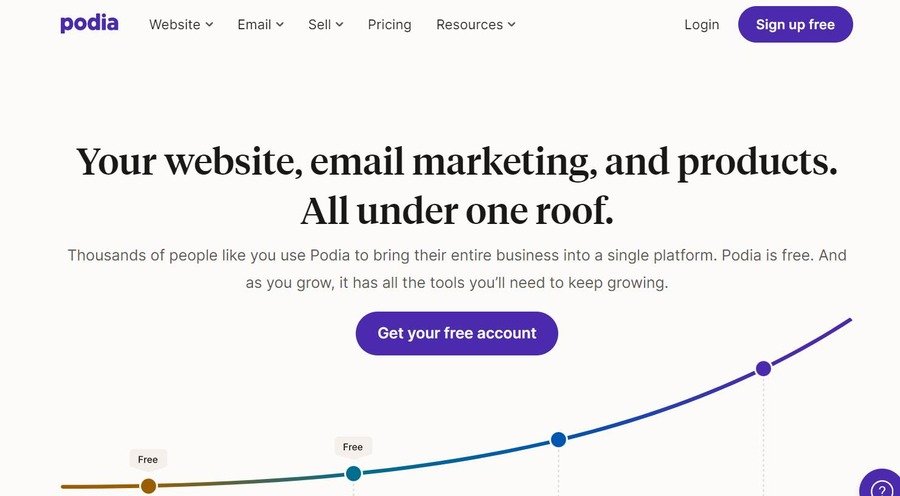
As someone who creates digital products, I understand the importance of a versatile platform that meets your exact needs. That’s why I highly recommend Podia. Podia began as a platform for creating online courses, but It has evolved into a platform that makes selling digital products easy for creators. It’s known for its user-friendly interface, seamless integration with email marketing tools, and robust marketing features. It offers customizable checkout pages, email marketing integrations, and detailed analytics.
- What you can sell: With a Podia account, you can sell digital products of all kinds, including courses, memberships, and digital downloads. You can also monetize communities, sell subscriptions, and even sell webinars.
- Ease of use: Podia’s biggest advantage is its ease of use. The no-code interface simplifies selling digital products online hassle-free.
- Pricing & fees: Podia has four different plans to choose from. There is no cost to the Free plan, but all sales will be subject to a 10% transaction fee. Paid plans (Mover, Shaker, and Earthquaker) all come with different features, benefits, and restrictions.
2. Gumroad

There are thousands of digital products on Gumroad, including eBooks, self-help courses, music, video lessons, and software.
This platform is where you can sell basically anything and present it to your customers how you like. Selling your digital product on Gumroad is easy. Besides offering customizable product pages, Gumroad offers email marketing tools and analytics for creators to promote their products. With Gumroad, creators can offer multiple payment options to their customers, such as credit cards, PayPal, Apple Pay, and Google Pay.
- What you can sell: You have no limitations with Gumroad. You can sell anything, whether a digital download, eBook, course, or monthly membership. Selling physical products, like printed books, clothing, and jewelry, is also possible.
- Ease of use: Gumroad makes selling simple. New users can upload their paid content files easily and start selling immediately.
- Pricing: Gumroad charges a 10% flat fee for everything you sell, with no monthly fees.
3. Etsy

Why is Etsy one of the best platforms for selling digital products? Etsy already has a large and established audience of buyers actively looking for digital products. Which can give your products a head start on reaching potential customers.
The Etsy marketplace has over 82 million active buyers and 6 million active sellers around the globe. The Etsy site features handmade and digital items marketed toward a diverse audience and focuses on handcrafted items. It’s a great place to get noticed by potential customers! The visibility and exposure it provides are simply outstanding.
- What you can sell: Etsy is the most suitable platform to sell handmade or vintage items, craft supplies, homemade beauty products, or candles. However, you can also sell many digital products on Etsy.
- Ease of use: Starting an Etsy shop may seem intimidating, but it’s relatively straightforward. Your only challenge will be the stiff competition you will face.
- Pricing: Etsy seller fees include Listing Fees, 20 cents per listing; transaction fees, 6.5% of the total item price, including shipping, gift wrapping, and additional personalization costs; and Etsy payments processing fees, 3% plus 25 cents.
4. Amazon KDP
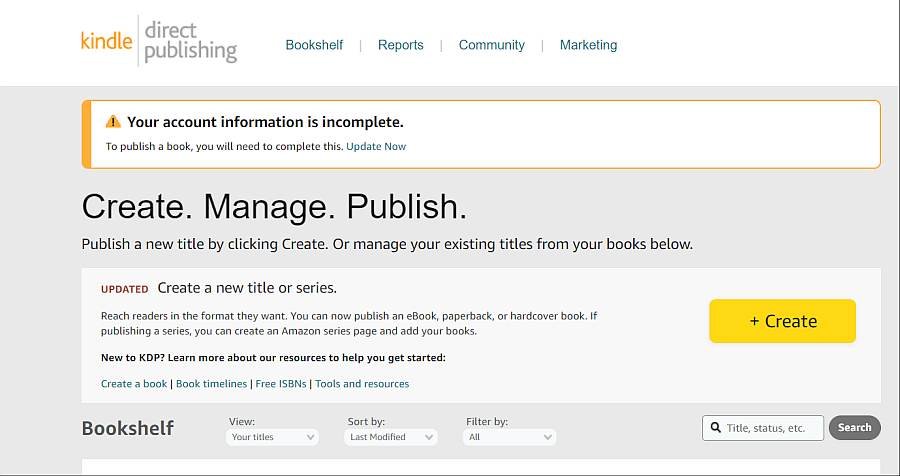
Amazon, the world’s largest e-commerce platform, has also ventured into the digital product space with its Kindle Direct Publishing (KDP) program. This self-publishing platform lets you create and publish ebooks, audiobooks, and other digital content directly on Amazon’s vast marketplace. Amazon KDP is easy to use and set up.
Create an account in just a few minutes, and you can begin publishing. Amazon is an excellent option for selling digital products, particularly for those new to self-publishing or looking to reach a global audience.
- What you can sell: Ebooks, audiobooks, print-on-demand (POD) books, and other digital products.
- Ease of use: The publishing platform (KDP) is relatively simple. The site provides guidelines for formatting your files. KDP’s conversion tool is necessary for creating a file for the Kindle platform (known as a .mobi file), but you can also use other software like Zamzar, and Online-Convert.
- Pricing: Free to create and publish ebooks. In KDP, authors don’t pay a setup fee, but shipping and printing costs are deducted from your total earnings before you receive your paycheck.
5. Creative Market

Creative Market is one of the best platforms for showcasing and selling digital products to a community of creative professionals. Creative Market is a haven for designers and artists selling digital assets such as templates, fonts, and illustrations. It’s an excellent platform for showcasing your creative work.
Are you a designer or an artist looking for a platform to showcase and sell your creations to a broader audience? One of the advantages of selling your digital products on Creative Market is that you can connect with over 10 million people worldwide. However, the downside is that the competition on this platform can be quite intense, especially in popular categories.
- What you can sell: Digital products, such as graphics, fonts, templates, illustrations, mockups, and photos.
- Ease of use: Easy to use, with a drag-and-drop interface.
- Pricing: It is free to create and list products, but there are fees for selling them. Creative Market charges higher commission rates than some other platforms, at 50% of the sale price of each product.
6. SendOwl
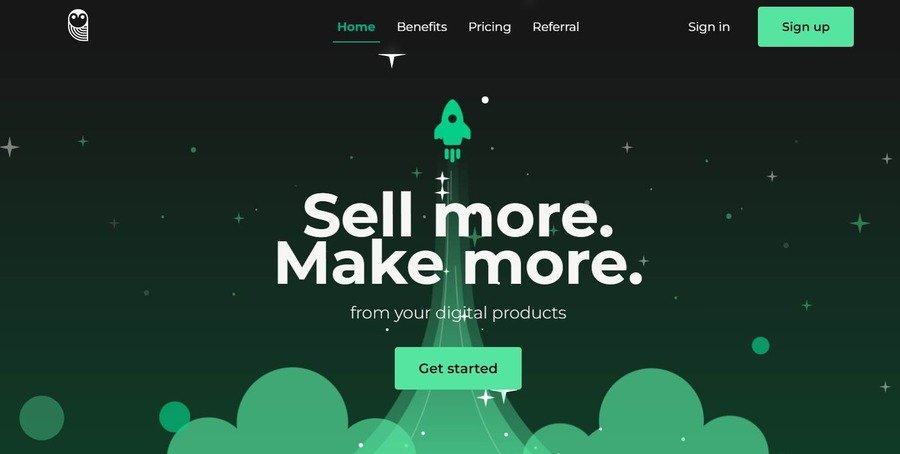
SendOwl is an all-in-one platform for selling and delivering digital products. It’s a cloud-based platform that makes it easy to create, sell, and manage your digital products from anywhere in the world.
With SendOwl, you can sell unlimited digital products, including ebooks, videos, music, templates, and more. If you’re looking for ways to promote your products, SendOwl can be a great solution. This platform provides various marketing tools such as email marketing, coupon codes, and affiliate programs to increase sales and reach a broader audience.
- What you can sell: Digital products and subscriptions.
- Ease of use: Moderately easy to use, with a bit of a learning curve
- Pricing: Free to start, with tiered pricing plans based on your number of products and customers.
7. Systeme.io
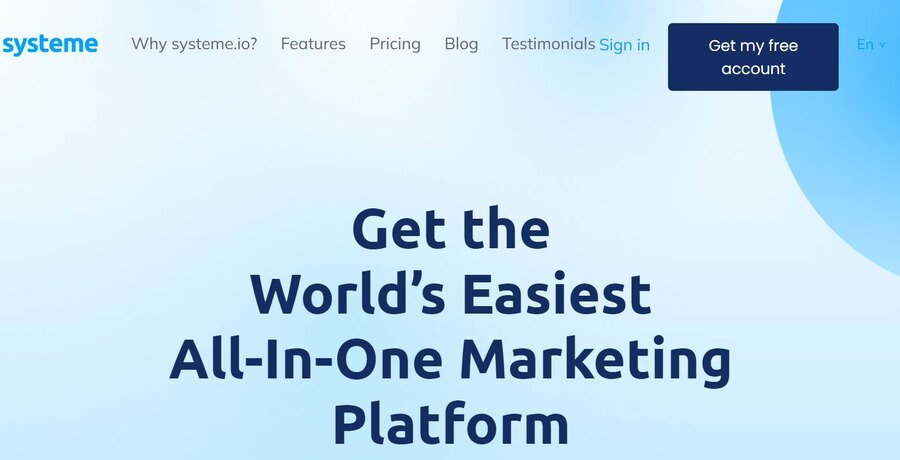
Less known but among the best platforms to sell digital products is Systeme.io. Systeme.io is a comprehensive suite for online businesses, including a platform for selling digital products. This unique tool makes it easy to create a professional online presence.
It’s got some cool automation features that help you create stunning sales pages, automate your marketing, and even set up email campaigns. You can also create a free website or sell your digital products without a website.
Systeme.io offers a free plan that allows you to sell unlimited digital products. The free plan is a great way to start if you are a beginner digital product creator. Once you have a few products and customers, you can upgrade to a paid plan to access more features and sell more products.
- What you can sell: Digital products, courses, and memberships.
- Ease of use: Easy to use, with a drag-and-drop interface. It provides a wide range of tutorials to help you get started.
- Pricing: It’s free to start, and then you’ll have tiered pricing plans based on the number of customers and features you need.
✨Read more: What is Systeme.io? A bloggers’ toolkit with 9 powerful features.
8. Easy Digital Downloads
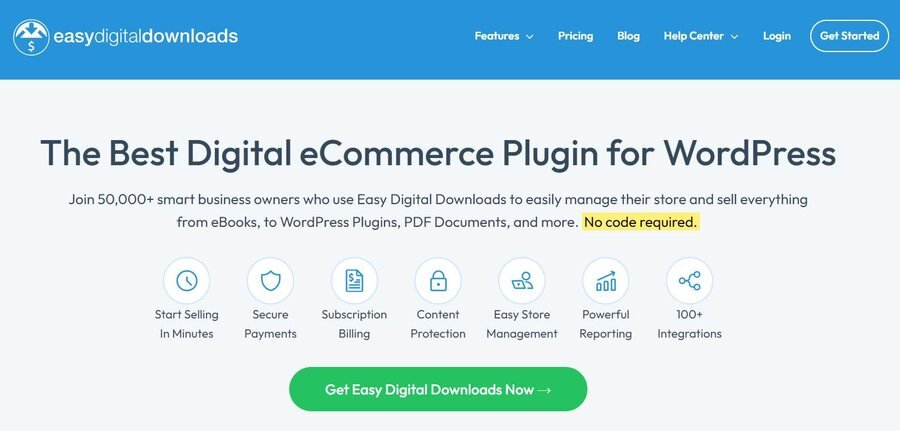
A popular WordPress plugin, Easy Digital Downloads (EDD), allows you to sell digital products directly from your site. It is an affordable and user-friendly solution for digital product creators of all experience levels.
The plugin is ideal for those with existing WordPress websites who want to integrate digital product sales into their existing platform with no effort. EDD offers a variety of pricing options and provides a secure checkout process that protects your customers’ information.
With EDD, you can easily make your checkout pages, product pages, and email templates look and feel like your own. It’s a great way to enhance your brand identity and give your customers a warm and friendly shopping experience!
- What you can sell: Digital products of all sorts.
- Ease of use: Moderately easy to use, with a bit of a learning curve.
- Pricing: The core plugin is basic but free to use. One wonderful aspect of the EDD paid version is that the paid version comes with a bunch of extra extensions and tools!
9. Payhip
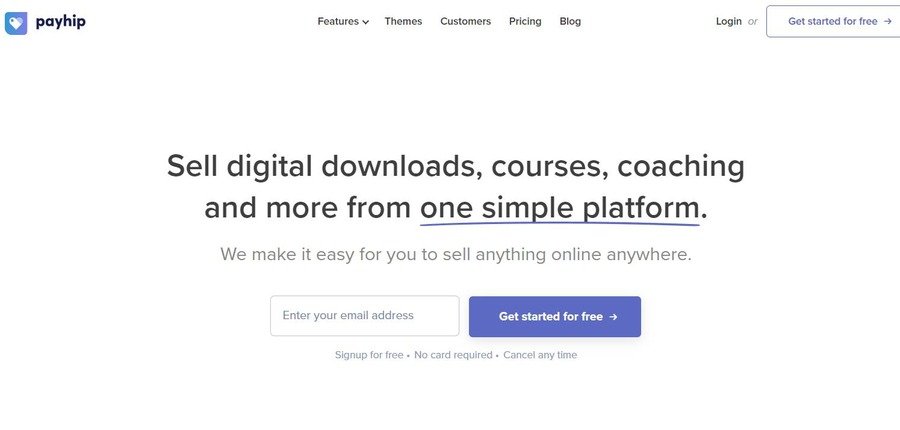
Payhip is a straightforward platform for selling digital products. It offers a simple interface and affordable pricing. It’s a good option for those who want a basic, easy-to-use platform without unnecessary bells and whistles.
Creating and managing your digital storefront with Payhip is as super easy. Drag-and-drop features make adding products, designing product pages, and setting prices a breeze. Track key metrics like product popularity, customer demographics, and conversion rates to pinpoint improvement opportunities. Payhip has top-notch security features to ensure your assets are safe and sound.
Meanwhile, the easy payment processing system makes it simple for your customers to buy your creations. The platform caters more to solopreneurs and creators than big businesses, making e-commerce easier by including automatic tax and VAT collection features.
- What you can sell: Digital products such as downloads, online courses, and membership sites, but you can also sell physical goods.
- Ease of use: Payhip is one of the most accessible online selling platforms I’ve encountered. Its easy-to-follow setup guide walks you through the basics of setting up your store and adding products.
- Pricing: Payhip has the most straightforward pricing plan. With all plans, you get the same features, as well as unlimited products and revenue. Plans differ only in their transaction fees. Payhip will take 5% of your income as a transaction fee with the forever-free plan.
10. Shopify

Are you looking to sell your digital creations online? Shopify, the leading e-commerce platform, has also entered the digital product space. Shopify is where you can showcase your ebooks, online courses, templates, and music to a global audience.
The platform takes care of secure payment processing for you. You don’t have to worry about your customers’ sensitive information as they use industry-standard security measures like SSL encryption. With Shopify, you can expand your business beyond borders and connect with customers from all corners of the globe. The digital products you sell are available in over 175 countries. It’s the perfect way to give your business a boost and reach out to more customers.
- What you can sell: Physical and digital goods, services, and subscriptions. This can include anything from clothing and electronics to streaming services and online courses. Whether it’s a tangible product or a virtual experience, there are countless options available for consumers to choose from.
- Ease of use: Easy to use, with a drag-and-drop interface.
- Pricing: Free to start with a limited plan, then tiered according to the number of products you sell.
Can you really make money selling digital products online?
Yes, you can definitely make money selling digital products online. Selling digital products can be lucrative with the right marketing strategy, a high-quality product, and a targeted audience. Whether e-books, online courses, software, or digital art, there is a growing demand for digital products in today’s online marketplace.
The best part is that you don’t need a lot of money to get started, and you can reach people all over the world! It’s definitely worth considering if you’re looking for a profitable venture.
What is the best website to sell digital products?
Of course, many other platforms are available for selling digital products. It all depends on what you’re looking for! Your unique needs and preferences will help you figure out which option is the best fit for you. However, these ten platforms provide an excellent starting point and offer a range of features and options for selling digital products online.
Frequently asked questions about the best platforms to sell digital products.
Are there any free platforms for selling digital products?
Yes, there are several free platforms for selling digital products, including Systeme.io, Gumroad, Podia, EasyDigitalDownloads, and Payhip.
Can I sell physical products on these platforms as well?
While some platforms may offer the ability to sell both digital and physical products, most are specifically designed to sell digital products.
Do these platforms handle taxes and other legal issues?
Many platforms offer tax and legal support, such as the ability to collect and remit sales taxes. However, it’s important to carefully review each platform’s terms and conditions to ensure compliance with all relevant laws and regulations.
Can I use my own domain name with these platforms?
Many platforms offer custom branding options, including the ability to use your own domain name.
How do I choose the right platform for my needs?
Consider the factors outlined in this article, including pricing, features, payment options, customization options, and analytics/reporting tools. Additionally, read reviews and compare multiple platforms before making a decision.
Conclusion
Deciding on the best platform for selling digital products on your blog can seem overwhelming. However, by considering the factors listed here, you can choose wisely.
Remember to evaluate each platform based on pricing, features, payment options, customization options, and analytics/reporting tools. Read reviews and compare multiple options before making a final decision.
With the right platform, you can turn your blog into a profitable digital product store and begin making money online.




![A foolproof guide to affiliate marketing for bloggers [to build a passive income] 16 A foolproof guide to affiliate marketing for bloggers [to build a passive income]](https://onefoxyblogger.com/wp-content/uploads/2022/03/affiliate-marketing-for-bloggers-1.jpg)
![Master the art of creating an ebook to sell online [read or miss out] 17 Master the art of creating an ebook to sell online [read or miss out]](https://onefoxyblogger.com/wp-content/uploads/2022/03/creating-an-ebook.jpg)